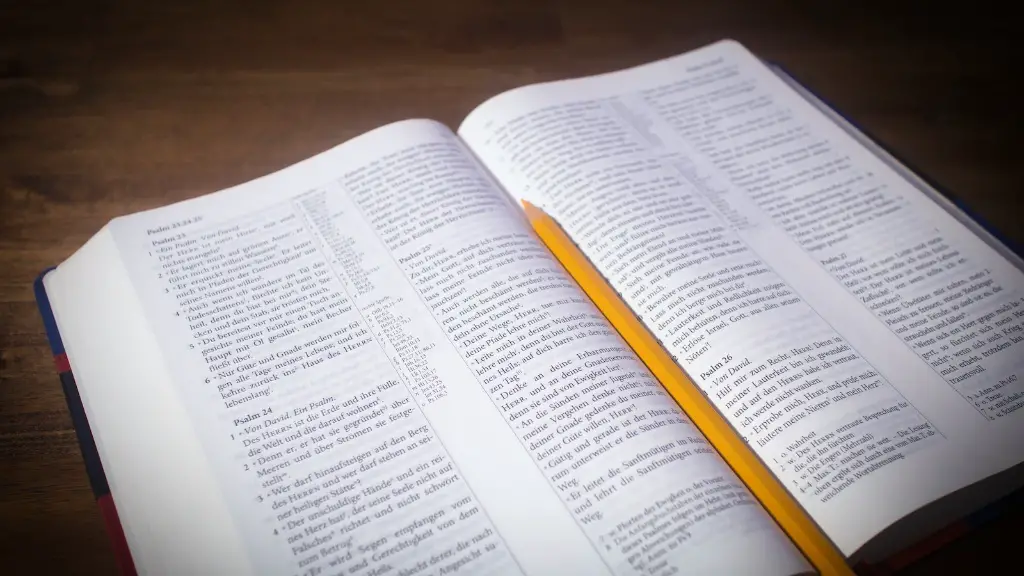What is Purgatory?
Purgatory, sometimes referred to as the Intermediate State, is a place where souls are cleansed and purified of the temporal punishment stored up from mortal sin. It is believed that those who have died in a state of grace, but not in a state of sanctification, must undergo a period of purification, before they can enter into Heaven. Although Purgatory is not explicitly mentioned in the Bible, there are some verses and passages that can be interpreted to refer to it.
Catholic Teaching about Purgatory
The Catholic Church teaches that Purgatory is a “state” or “place” where souls are purified in order to enter heaven. Souls in Purgatory are those who, while still in a state of grace, must be purified of the temporal punishment due to mortal sin. According to Catholic teaching, the purification process can last many years and includes the suffering of certain trials and punishments.
verses from the Bible
There are many verses from the Bible that can be interpreted as suggesting the existence of Purgatory. One of the most famous is 2 Maccabees 12:41-46 which speaks of Judas offering prayers, sacrifices and alms on behalf of the dead, in order that they might be released from their sins. This passage has been seen as an indication of belief in prayer for the dead, which is also associated with the doctrine of Purgatory.
Another frequently cited passage is Matthew 5:25-26. This speaks of someone being reconciled to his brother, “lest he be thrown into prison and you the judge be cast into hell.” The interpretation of this passage is that there is a place of punishment, known as “prison”, but not nearly as severe as hell, which is similar to the Catholic concept of Purgatory.
Parable about Purgatory
The parable of Lazarus and the rich man also offers an interesting insight into the Catholic belief in Purgatory (Luke 16:19-31). In this parable, a rich man and Lazarus, a poor man, both died and went to different places. The rich man is in a place of torment and Lazarus is in a place of rest. What is interesting about this passage is that the poor man goes to a place of rest, but not Heaven. This is seen as an indication of Purgatory, as they must wait in a state of rest until they are purified and can enter Heaven.
Intercession of the Saints
The Catholic belief in Purgatory is also reflected in the belief in the intercession of the saints. The Church teaches that the prayers of the living can benefit the souls of the departed and help them in their journey to purification and ultimate union with God. This is seen as an act of charity, offering assistance to those in need.
Interpretations of Scriptures
The Catholic Church does not reject the interpretation of certain passages from the Bible that point to Purgatory. While the Church does not believe that every passage from the Bible should be taken literally, it does believe that certain “allegorical” passages can be interpreted in such a way as to support its teachings.
The Role of the Church
The Church also teaches that the Church itself plays a role in the purification process. The Church teaches that those who are in Purgatory can still be helped by the Church, through prayers, sacrifices and the offering of Masses in their behalf. This, in turn, is seen as proof of the Church’s role in helping the faithful to reach their final destination.
Impact of Purgatory
The belief in Purgatory has a profound impact on how Catholics view the afterlife. It helps to bring hope and consolation to those who are grieving the loss of a loved one, and it provides an assurance that their loved one is still in a state of grace, and that they can help them to purify and cleanse their souls. It also serves as a reminder to the living to stay focused on the life of faith, knowing that all of us must one day face our own purification before entering Heaven.
How to be Freed from Purgatory
The Catholic Church teaches that a person can be purified from the spiritual state of Purgatory by making a Christian offering of prayer, fasting and almsgiving. Sacramentals, such as the use of holy water, are also seen as important in the process of purification. The prayers of the faithful, both living and dead, are also seen as important in the purification process.
Charitable Acts & Other Sacraments
The Church urges the faithful to perform charitable acts in order to help those in Purgatory, as well as offering Masses, confessions, and Communions in their behalf. It is believed that these spiritually beneficial acts can help to accelerate the process of purification.
Gaining Merit in Heaven
The Church also teaches that those who perform charitable acts in favor of those in Purgatory are rewarded in Heaven. It is seen as an extension of the heavenly reward earned by those who make sacrifices in the name of those who have gone before them. Furthermore, those who suffer fatefully on earth, as well as those who practice charity of any kind, are believed to receive a stronger measure of heavenly mercy.
Communion of Saints
The belief in Purgatory is also closely connected to the Church’s belief in the “Communion of Saints”. This is the belief that all members of the Church, both living and dead, are united in one body, with one common faith and purpose. This is seen as being related to the concept of Purgatory, in that the prayers, mercy and assistance of the living can help to reduce the length of time a soul must remain in Purgatory.
Indulgences
The Catholic Church also teaches that certain acts, such as receiving a plenary indulgence, can help to reduce the temporal punishment due for sins that have already been forgiven. Receiving an indulgence means taking a special action or undertaking a specific action, such as performing certain devotions or visiting specific holy places. This is seen as a way of “making up” for the temporal punishment due for sins that have already been pardoned.
Annulment & Purification
The Church also teaches that the Sacrament of Penance can help the repentant sinner to receive the forgiveness of God, thereby purifying the soul of the temporal punishment due to mortally sinful acts. This purification can also be attained through the Sacraments of Matrimony and Annulment which, though they are separate and distinct, both involve a purification process.
Conclusion
Purgatory is an essential part of Catholic beliefs and is seen as a place of purification and hope for those who have departed this life in a state of grace. Although it is not explicitly mentioned in the Bible, there are some passages that are believed to allude to the existence of Purgatory. Through prayer, fasting and almsgiving, and the intercession of the saints, the faithful can help to accelerate the process of purification and bring those in Purgatory to the embrace of God.



